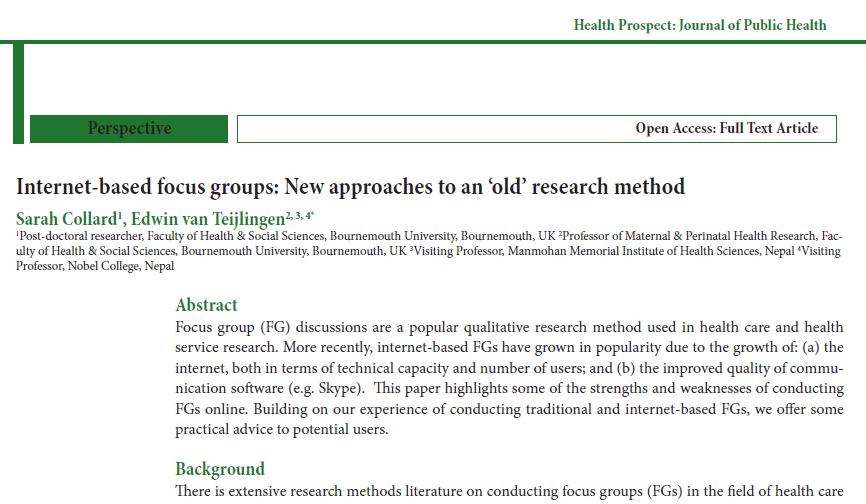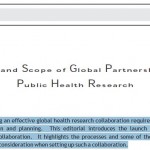 Today saw the publication of a new methods paper by Dr. Sarah Collard, post-doctoral researcher in the Faculty of Health & Social Sciences (FHSS) and Prof. Edwin van Teijlingen in the academic journal Health Prospect. This new paper addressed some of the key methodological issues associated with Internet-based Focus Groups (FGs) or the so-called Online Focus Group Discussions [1]. Traditional face-to-face FG discussions are a popular qualitative research method used a wide-range of areas, such as political sciences, marketing, health service research and sociology to name but a few disciplines. More recently, internet-based FGs have grown in popularity due to the growth of: (a) the internet, both in terms of technical capacity and number of users; and (b) the improved quality of communication software (e.g. Skype). This paper highlights some of the strengths and weaknesses of conducting FGs online. Building on our experience of conducting traditional and internet-based FGs.
Today saw the publication of a new methods paper by Dr. Sarah Collard, post-doctoral researcher in the Faculty of Health & Social Sciences (FHSS) and Prof. Edwin van Teijlingen in the academic journal Health Prospect. This new paper addressed some of the key methodological issues associated with Internet-based Focus Groups (FGs) or the so-called Online Focus Group Discussions [1]. Traditional face-to-face FG discussions are a popular qualitative research method used a wide-range of areas, such as political sciences, marketing, health service research and sociology to name but a few disciplines. More recently, internet-based FGs have grown in popularity due to the growth of: (a) the internet, both in terms of technical capacity and number of users; and (b) the improved quality of communication software (e.g. Skype). This paper highlights some of the strengths and weaknesses of conducting FGs online. Building on our experience of conducting traditional and internet-based FGs.
Dr. Sarah Collard is affiliated with BU’s Centre for Qualitative Research (CQR). Health Prospect is an Open Access journal therefore this article is freely available to any reader across the globe.
Reference:
- Collard, S., van Teijlingen, E. (2016) Online focus group: New approaches to an ‘old’ research method, Health Prospect 15(3):4-7.
 Congratulations to Dr. Regmi new publication
Congratulations to Dr. Regmi new publication Congratulations to Dr. Keen on new Nepal publication
Congratulations to Dr. Keen on new Nepal publication










 Beyond Academia: Exploring Career Options for Early Career Researchers – Online Workshop
Beyond Academia: Exploring Career Options for Early Career Researchers – Online Workshop UKCGE Recognised Research Supervision Programme: Deadline Approaching
UKCGE Recognised Research Supervision Programme: Deadline Approaching SPROUT: From Sustainable Research to Sustainable Research Lives
SPROUT: From Sustainable Research to Sustainable Research Lives BRIAN upgrade and new look
BRIAN upgrade and new look Seeing the fruits of your labour in Bangladesh
Seeing the fruits of your labour in Bangladesh ECR Funding Open Call: Research Culture & Community Grant – Apply now
ECR Funding Open Call: Research Culture & Community Grant – Apply now ECR Funding Open Call: Research Culture & Community Grant – Application Deadline Friday 12 December
ECR Funding Open Call: Research Culture & Community Grant – Application Deadline Friday 12 December MSCA Postdoctoral Fellowships 2025 Call
MSCA Postdoctoral Fellowships 2025 Call ERC Advanced Grant 2025 Webinar
ERC Advanced Grant 2025 Webinar Update on UKRO services
Update on UKRO services European research project exploring use of ‘virtual twins’ to better manage metabolic associated fatty liver disease
European research project exploring use of ‘virtual twins’ to better manage metabolic associated fatty liver disease